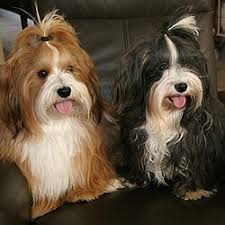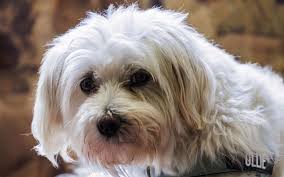The Havanese, also known as the Bichon Havanais, is a small dog breed that originated in Cuba. This charming canine is beloved by many for its playful and affectionate nature, as well as its gorgeous, silky coat.
One of the most distinctive features of the Havanese is its long, flowing fur, which comes in a range of colors including white, cream, black, and various shades of brown. This luxurious coat requires regular grooming to keep it in top condition, but it’s well worth the effort for the stunning results.
But the Havanese is more than just a pretty face (and fur). This breed is known for its intelligence and adaptability, making it a popular choice for families and individuals alike. Havanese dogs are quick learners and are eager to please, which makes them a joy to train.
Additionally, Havanese dogs are incredibly social animals and thrive on human interaction. They love nothing more than snuggling up with their owners and getting plenty of attention and affection. If you’re looking for a loyal and loving companion, the Havanese might just be the perfect breed for you.
Of course, like any dog, the Havanese has its quirks and quirks. For one thing, these dogs can be quite vocal and are known to bark at just about anything that catches their attention. They also have a tendency to be stubborn at times, so training can require patience and persistence.
But overall, the Havanese is a wonderful breed that brings joy and companionship to countless households around the world. Whether you’re looking for a playful playmate or a loyal lap dog, the Havanese is sure to win your heart with its delightful personality and adorable appearance.
In addition, if you’re looking for a small dog that’s big on personality, the Havanese is an excellent choice. With its stunning coat, charming demeanor, and unwavering loyalty, this breed is sure to bring a smile to your face and a wag to your tail. So why not consider adding a Havanese to your family today? You won’t regret it.
Read Also: Shar Pei Dog: Description, Health, History and Care Guide
History and Origin of the Havanese Dogs

The Havanese is a breed with a fascinating history that spans several centuries. These dogs are thought to have originated in Cuba, where they were developed by breeding various Bichon-type dogs with local breeds.
The Havanese likely descended from Bichon-type dogs that were brought to Cuba by Spanish settlers in the 16th century. These dogs were originally bred for companionship, and their small size and affectionate nature made them popular with wealthy Cuban families.
Over time, the Havanese breed developed distinct characteristics that set it apart from other Bichon-type dogs. For example, the Havanese has a unique coat texture that’s thicker and more wavy than that of other Bichon breeds. This may be due to the influence of local breeds in Cuba, which were known for their thick and resilient coats.
In the 19th century, the Havanese became even more popular as a companion dog, particularly among the upper classes in Cuba. However, political upheaval in Cuba in the mid-20th century led to a decline in the breed’s population, and by the 1960s, Havanese dogs were almost extinct.
Fortunately, a handful of dedicated breeders in Cuba and the United States worked to revive the Havanese breed. These breeders carefully selected dogs with the desired traits and bred them to create a new generation of Havanese puppies.
Today, the Havanese is recognized by major kennel clubs around the world and is a popular breed in many countries. Despite their relatively recent comeback, Havanese dogs have a long and fascinating history that speaks to their enduring appeal as beloved family pets.
Health Issues and Lifespan of Havanese Dogs
One of the most common health issues in Havanese dogs is luxating patella, which is a condition in which the kneecap dislocates from its normal position. This can cause pain and lameness, and in severe cases, surgery may be required to correct the problem.
Another health issue to watch out for in Havanese dogs is progressive retinal atrophy (PRA), a genetic disorder that can cause vision loss and eventually blindness. Breeders should test their dogs for PRA and should not breed dogs that carry the gene for this condition.
Havanese dogs can also be prone to allergies, especially to certain foods, and skin irritations. Regular grooming and cleaning of their coat and ears can help prevent these issues from developing.
Other potential health concerns in Havanese dogs include hip dysplasia, heart conditions, and dental problems. It’s important for owners to keep up with regular veterinary check-ups and to watch for any signs of illness or discomfort in their dogs.
To help ensure the health and longevity of your Havanese, it’s important to choose a reputable breeder who screens their dogs for genetic disorders and other health issues. Additionally, maintaining a healthy diet, providing regular exercise, and keeping up with preventative care such as vaccinations and parasite control can all help keep your Havanese in top shape.
Havanese Dog Breed Complete Grooming and Care Guide

Coat Care: The Havanese has a luxurious, silky coat that requires regular grooming to keep it in top condition. Brush your Havanese’s coat at least a few times per week to prevent tangles and mats from forming. You may also want to trim their coat to keep it at a manageable length. Regular bathing is also recommended to keep their coat clean and shiny.
Nail Care: Trim your Havanese’s nails regularly to prevent them from getting too long, which can be uncomfortable for your dog and can also cause damage to your floors and furniture. You can use a nail clipper or grinder to trim your dog’s nails.
Ear Care: Havanese dogs have long, floppy ears that can trap moisture and dirt, which can lead to infections. Check your dog’s ears regularly for signs of redness, swelling, or discharge. Clean their ears with a gentle, vet-recommended solution and cotton balls or pads.
Dental Care: Regular dental care is important for keeping your Havanese’s teeth and gums healthy. Brush your dog’s teeth at least a few times per week with a dog-friendly toothpaste and toothbrush. You may also want to provide your dog with dental chews or treats to help keep their teeth clean.
Exercise: Havanese dogs are active and playful, so it’s important to provide them with plenty of exercise and mental stimulation. Daily walks, playtime, and interactive toys can all help keep your Havanese happy and healthy.
Training: Havanese dogs are intelligent and eager to please, which makes them relatively easy to train. Positive reinforcement techniques, such as rewards and praise, work well with this breed. Socialization is also important for Havanese dogs, so expose your dog to a variety of people, places, and experiences from a young age.
Healthcare: Regular veterinary check-ups are essential for maintaining your Havanese’s health. Your vet can provide vaccinations, parasite prevention, and other preventative care. It’s also important to keep an eye out for any signs of illness or discomfort in your dog and to seek veterinary care as needed.
Additionally, grooming and caring for your Havanese requires regular attention and effort, but the rewards are well worth it. By providing your dog with proper care, you can ensure that they stay healthy, happy, and looking their best.
Read Also: Importance of Records Maintenance in the Poultry Farm
Havanese Puppies
Havanese puppies are known for their playful and affectionate personalities, as well as their adorable looks. If you’re considering getting a Havanese puppy, here’s what you should know:
Havanese puppies are small, fluffy dogs with long, silky hair that comes in a variety of colors, including white, black, cream, and chocolate. They have dark, expressive eyes and a friendly, curious expression. Havanese puppies typically weigh between 7 and 13 pounds when fully grown.
Havanese puppies are friendly, outgoing, and social dogs that thrive on human interaction. They are intelligent and eager to please, which makes them relatively easy to train. Havanese puppies also tend to get along well with children and other pets, making them a great choice for families.
As mentioned, Havanese puppies are intelligent and eager to please, which makes them relatively easy to train. Positive reinforcement techniques, such as rewards and praise, work well with this breed. Socialization is also important for Havanese puppies, so expose your puppy to a variety of people, places, and experiences from a young age.
Havanese puppies have long, silky hair that requires regular grooming to keep it in top condition. Brush your Havanese puppy’s coat at least a few times per week to prevent tangles and mats from forming. You may also want to trim their coat to keep it at a manageable length. Regular bathing is also recommended to keep their coat clean and shiny.
Regular veterinary check-ups are essential for maintaining your Havanese puppy’s health. Your vet can provide vaccinations, parasite prevention, and other preventative care. It’s also important to keep an eye out for any signs of illness or discomfort in your puppy and to seek veterinary care as needed.
In conclusion, Havanese puppies are adorable, affectionate, and playful dogs that make great companions for families and individuals alike. By providing your Havanese puppy with proper care and training, you can help ensure that they grow up to be healthy, happy, and well-behaved adults.
Frequently Asked Questions About Havanese Dogs
1. What is the origin of the Havanese breed?
The Havanese, also known as the Bichon Havanais, originated in Cuba. It likely descended from Bichon-type dogs brought to Cuba by Spanish settlers in the 16th century. These dogs were bred for companionship and became popular among wealthy Cuban families.
2. What is the temperament of a Havanese?
Havanese dogs are known for their affectionate, loyal, and playful personalities. They love being around people, are great with children and other pets, and thrive on human interaction, making them excellent companion dogs.
3. How much grooming does a Havanese require?
Havanese have long, silky coats that require regular grooming to prevent matting and tangling. Daily brushing and trimming every six to eight weeks are recommended to keep their coat healthy and clean.
4. Are Havanese dogs good for people with allergies?
Yes, Havanese are considered hypoallergenic because they shed very little. However, their coats still require consistent grooming to maintain their condition and prevent issues like matting.
5. What is the lifespan of a Havanese?
Havanese dogs have a long lifespan, typically living between 14 to 16 years, though this can vary depending on their health and lifestyle.
6. Do Havanese dogs need a lot of exercise?
Havanese are active but do not require extensive exercise. A short daily walk and some playtime, such as fetch or romping in the yard, are sufficient to keep them happy and healthy.
7. Are Havanese prone to any specific health issues?
Havanese are generally healthy but can be prone to health issues like hip dysplasia, patellar luxation, and deafness. Regular veterinary check-ups and screenings are recommended to catch potential issues early.
8. Are Havanese good for apartment living?
Yes, Havanese are highly adaptable and well-suited for apartment living. Their small size and moderate exercise needs make them ideal for smaller spaces, as long as they receive enough attention and interaction.
Read Also: Best Practices for Safe and Sustainable Waste Disposal Of Hospital Wastes

